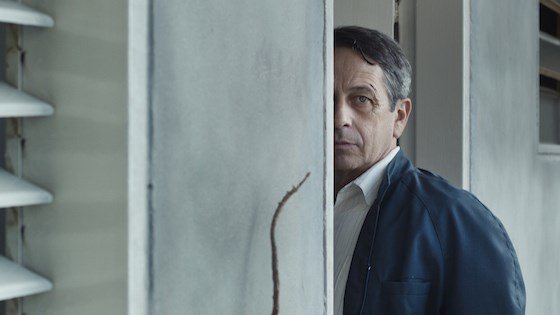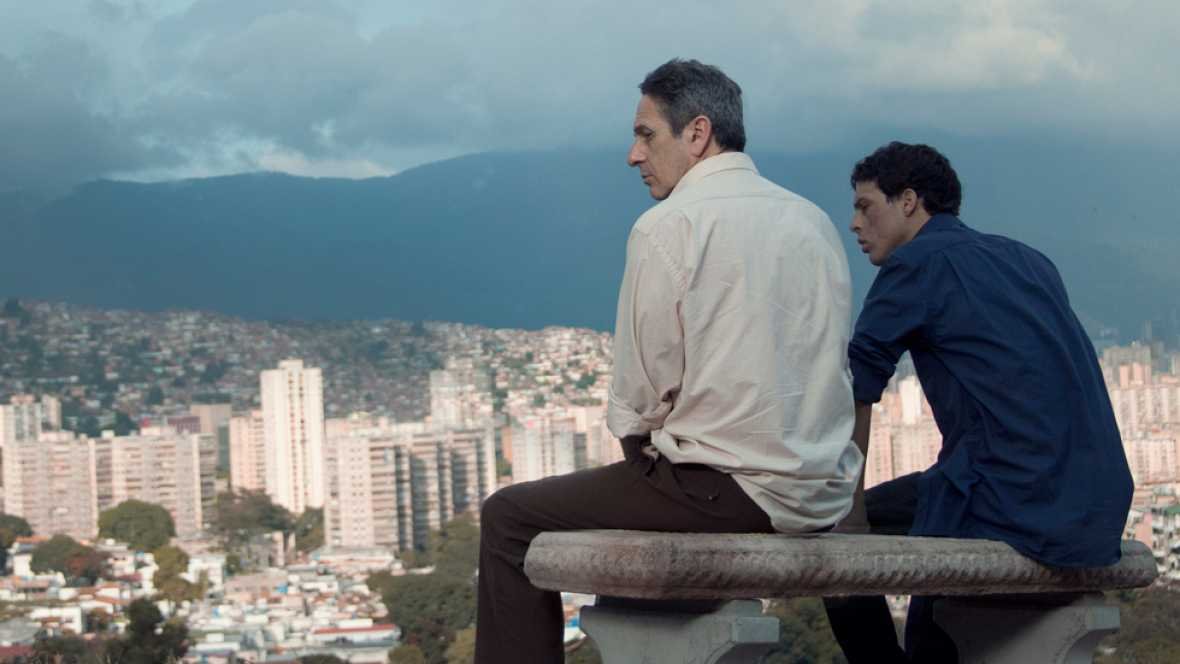Desde allá & Eastern Boys: Economies of Desire in France and Venezuela
Desde allá, Lorenzo Vigas (2015)
Desde allá (From Afar), a first feature from Venezuelan filmmaker Lorenzo Vigas, won the Golden Lion for Best Film in Competition at last year's Venice Film Festival. Desde allá paints a very particular Caracas-set love story between Armando, a wealthy middle-aged man who makes dentures for a living, and Elder, a local teenager he solicits for sex.
At the 2013 Venice Film Festival, Moroccan-born French director Robin Campillo's Eastern Boys won Best Film in the festival's Orizzonti section. Daniel, a wealthy middle-aged man, cruises Paris' Gare du Nord train station. His life is changed when he solicits Marek, a young immigrant, for sex.
The existence of these two films, in such proximity, posits a new sub-genre within the increasingly diverse movement of queer-themed stories in art-house cinema. Despite a strikingly similar premise, Desde allá and Eastern Boys exhibit quite diverse narrative voices and even more disparate conclusions. What do their opening sequences communicate of the socio-political realities of Caracas, and Paris? What elements remain?
These aren't simply stories of bleak middle-aged men cruising for rent boys; they're love stories that evolve into social contracts, expose the transactional nature of relationships, and offer a new lens of inquiry into the bond between father and son, citizen and state.
Desde allá, Lorenzo Vigas (2015)
Desde allá opens on a group of teenagers hanging about the streets of Caracas. Trash litters the street; the frame, while sunny, is de-saturated. A form creeps into the static composition and focus racks to his face: middle-aged, his gaze on the teenagers. In a single shot that at once demonstrates an arresting command of cinematography to reveal a character's alienated inner state, and a trust in the audience to fill in the blanks, the man walks toward the teenagers—focus lingers on the absent place where he once stood.
A more attractive member of the teenage bunch climbs onto a crowded bus. Our protagonist tails him, watches him through the loose hanging arms of other passengers. He then moves to sit beside the teenager and pulls a fat stack of cash from his pocket.
Cut to inside the man's apartment. Until now, the sequence unfolds without dialogue.
Eastern Boys, Robin Campillo (2015)
The opening sequence of Eastern Boys is crowded by comparison. Quick cuts and long-lensing from above recall the opening scene of Coppola's The Conversation, except this San Francisco square is the Gare du Nord train station in Paris, the subjects a group of nefarious teenagers who don't speak the local tongue. Threat of authority is ever present—the audience's gaze as if through surveillance cameras, station guards lurking on the edge of frame. Eventually we notice, too, an adult with his own agenda—a middle-aged man carrying a briefcase, nervous to go unseen.
This man approaches the more aloof, sinewy teenager of the bunch who walks back in the station. Ensconced beneath a staircase in broken English, the teen sets his price: "I do everything… 50 euro."
Eastern Boys, Robin Campillo (2015)
In Desde allá and Eastern Boys, each protagonist's 'approach' functions as a mise-en-abîme of the Director's own engagement with the narrative. Vigas's minimalist storytelling, while detached, is potent in its economy. Detail rather than exposition seeps the audience in Campillo's very particular, very French milieu of class and inter-cultural inquiry. Both sequences elide exposition, privileging imagery and behavior to set the tone of what evolve into somber love stories predicated at least initially on transaction.
The central relationships—between the older Armando and the younger Elder in Desde allá, between Daniel and Marek in Eastern Boys—thus become love stories that double as political meditations. Eastern Boys' opening sequence establishes power dynamics and social hierarchy; Marek's naming of a price places us in a market in which he acknowledges himself as a commodity, his value definitive. Desde allá, on the other hand, opens on trash in the streets, cramped buses, blurry crowds. We never know how much cash Armando sets aside in thick wads—Elder's value feels less like payment and more like a bribe.
In both films, the pursuing adult ultimately rejects the increasingly affectionate teenager and romance shifts to paternalism. Love stories, then, become a framework by which to examine the nature of social contracts in the films' relative nations: France and Venezuela.
Desde allá, Lorenzo Vigas (2015)
Elder has been abandoned by his father in a world where poverty is taken as a given. Equally, even the adult Armando lurks in the shadows, observing the quotidian activity of a much older, much wealthier man one assumes is his own father. In Venezuela, it follows, paternal dysfunction is inherited.
On the other hand Marek's poverty is a function of circumstance: he is an illegal immigrant having fled war-ravaged Chechnya as a child. The titular Eastern Boys are his makeshift family. Young and forsaken, this fraternity of lost brothers is characterized by an enforced hierarchy with draconian penalties for defection. And yet, Campillo draws these characters as all deeply human.





